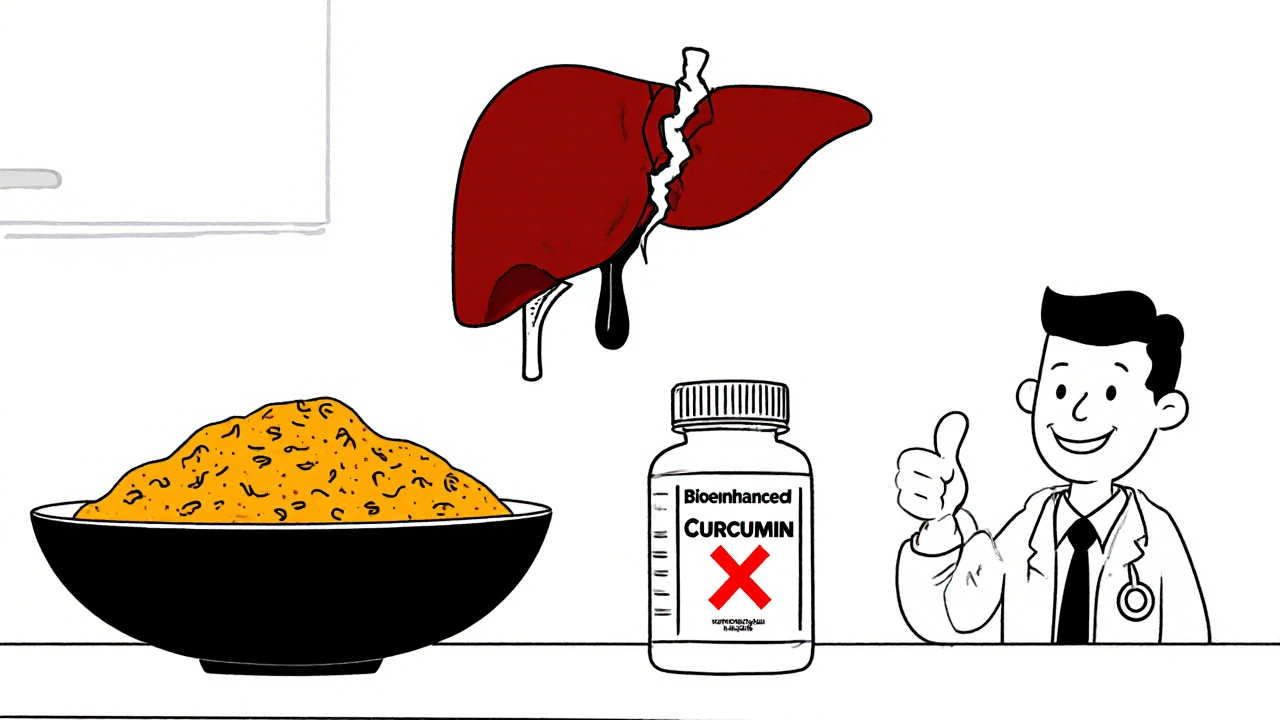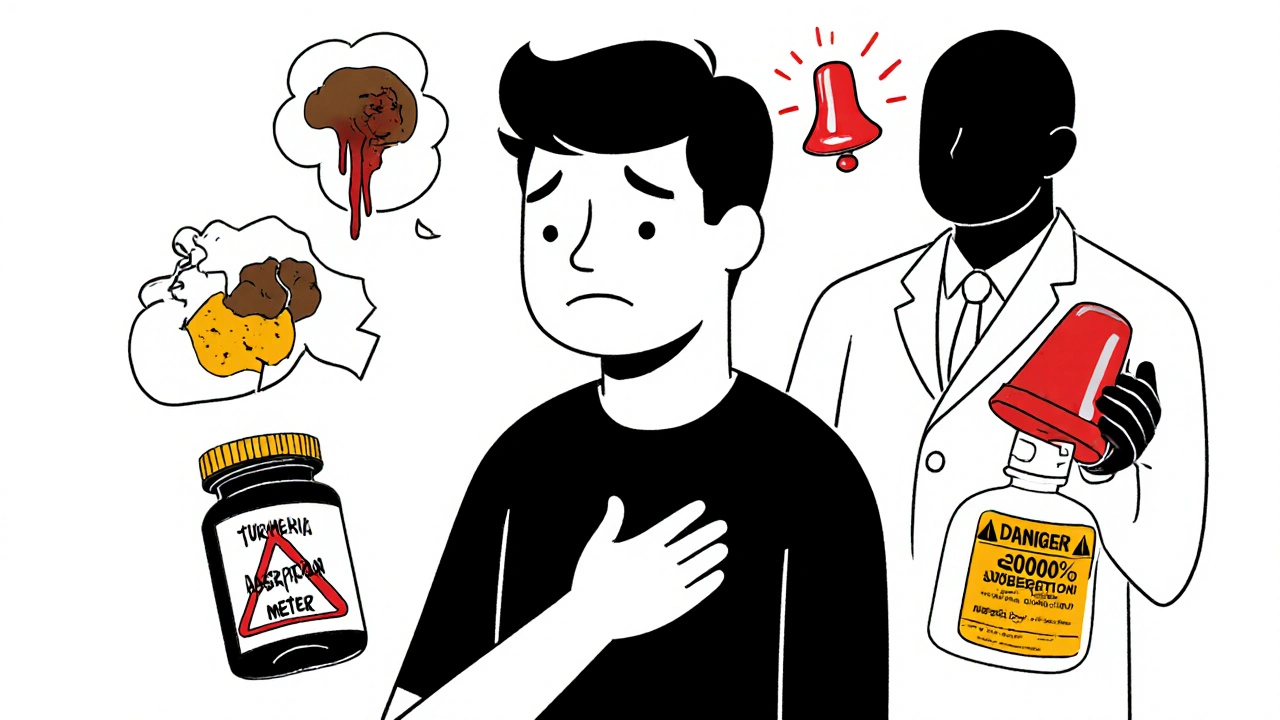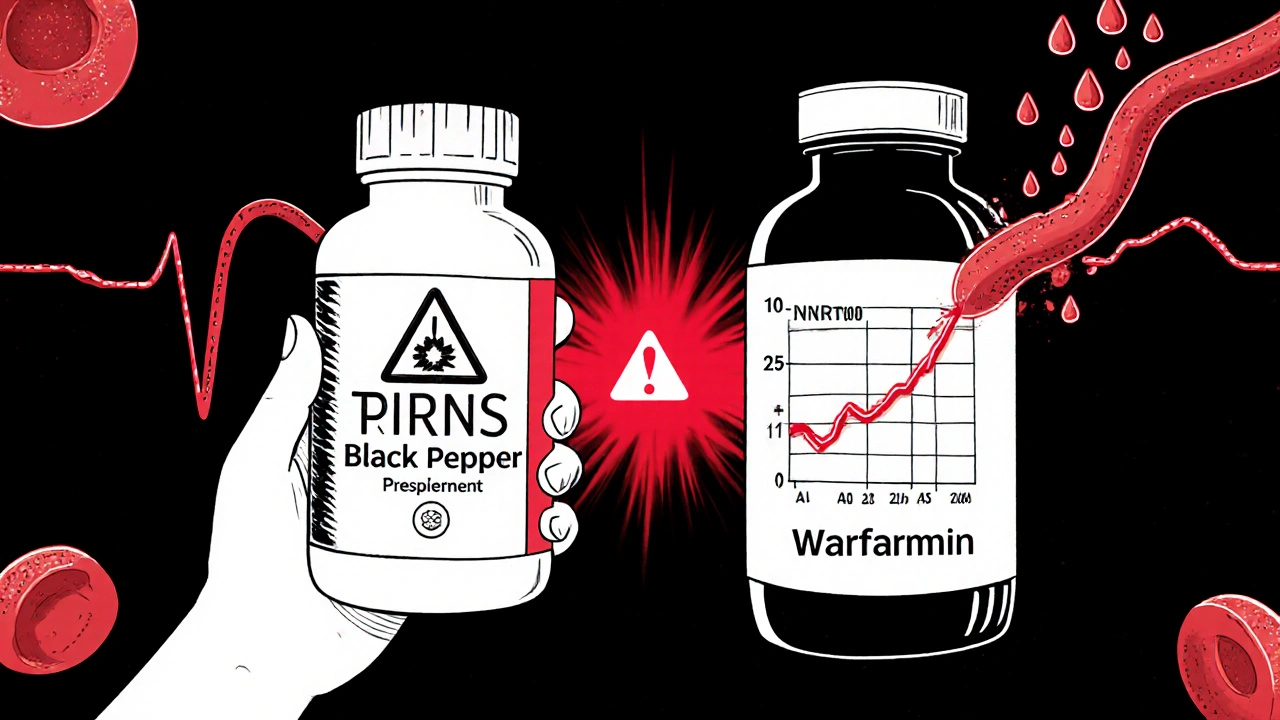INR Interaction Calculator
This calculator estimates potential INR changes when taking turmeric supplements while on blood thinners. Important: This is not medical advice. Always consult your doctor before making changes to your medication regimen.
If you're taking a blood thinner like warfarin, apixaban, or clopidogrel, and you've started popping turmeric and black pepper capsules because they're "natural anti-inflammatories," you could be putting yourself at serious risk. This isn't speculation-it's documented in medical case reports and backed by pharmacology studies. The combination of turmeric and black pepper doesn't just boost health benefits; it can dangerously amplify the effects of your medication, leading to uncontrolled bleeding, liver damage, or even hospitalization.
Why Turmeric Alone Is a Problem
Turmeric contains curcumin, a compound that naturally thins the blood. It does this by reducing platelet clumping and interfering with clotting factors. That sounds good if you're trying to avoid clots-but when you're already on a prescription blood thinner, it's like stepping on the gas while someone else is holding the brake. The result? Your blood becomes too thin.Studies show that curcumin can raise your INR (International Normalized Ratio), the key measurement doctors use to track how well warfarin is working. A normal INR for someone on warfarin is usually between 2.0 and 3.0. Go above 4.0, and your risk of internal bleeding spikes. One documented case involved a patient whose INR jumped from 2.5 to 6.8 after starting a daily turmeric supplement-even though their diet and other medications hadn't changed. That’s not a coincidence. It’s a direct interaction.
It’s not just warfarin. Turmeric also interacts with other blood thinners like heparin, enoxaparin, clopidogrel (Plavix), and even over-the-counter painkillers like aspirin and ibuprofen. The British Heart Foundation warns that these combinations can lead to excessive bruising, nosebleeds, blood in urine or stool, and in severe cases, life-threatening internal bleeding.
Black Pepper Makes It Worse-A Lot Worse
Here’s where things get even riskier. Most turmeric supplements today include black pepper extract, labeled as "piperine" or "bioenhanced curcumin." Marketers claim it helps your body absorb more of the good stuff. And they’re right-but that’s the problem.Piperine increases curcumin absorption by up to 2,000%. That means instead of your body processing 10 mg of curcumin, it’s now handling 200 mg. That’s a 20-fold increase in concentration. Your liver wasn’t designed to handle that kind of surge, especially when it’s already busy metabolizing your blood thinner.
Piperine doesn’t just help curcumin. It also blocks liver enzymes (CYP3A4 and P-glycoprotein) that break down many medications, including warfarin, apixaban, and rivaroxaban. This causes those drugs to build up in your bloodstream. One study found that when curcumin was taken with sulfasalazine, its blood levels jumped 3.2 times higher. Imagine what happens when it’s paired with something as sensitive as warfarin, where the difference between a safe dose and a toxic one is tiny.
Real People, Real Consequences
Medical journals and patient forums are full of stories that sound like warnings from a thriller novel:- A 68-year-old man on apixaban took one teaspoon of turmeric powder daily for three weeks. He developed severe gastrointestinal bleeding and ended up in the ER.
- A woman on warfarin started a turmeric-black pepper capsule routine after reading an Instagram post about "natural healing." Within six weeks, her INR hit 7.1. She needed a transfusion.
- Another patient reported dark urine, yellowing skin, and extreme fatigue-classic signs of liver injury-after using a "premium turmeric with black pepper" supplement for eight weeks.
These aren’t rare outliers. According to the Welsh Medicines Advice Service, these types of interactions are increasingly common. And the problem is growing. In 2022, over 18% of American adults reported taking turmeric supplements. Meanwhile, 8.4 million Americans are on prescription anticoagulants. That’s millions of potential collisions waiting to happen.

Dietary Turmeric vs. Supplements: The Big Difference
Here’s the good news: eating turmeric in your food is generally safe.If you’re adding a teaspoon of turmeric to your curry, soup, or golden milk, you’re consuming maybe 100-200 mg of curcumin. That’s nowhere near the 500-1,000 mg found in a single supplement capsule. Your body handles small amounts naturally. The liver processes it slowly, and the risk of interaction is minimal.
But supplements? They’re concentrated. They’re designed to flood your system. And when they’re paired with black pepper? That’s not nutrition-it’s pharmacology.
The Cleveland Clinic and the British Heart Foundation both agree: culinary use is fine. Supplements are not.
What Your Doctor Won’t Always Ask
You might think you’re being honest by telling your doctor about your blood thinner. But do you mention the turmeric capsules you take every morning?A 2022 JAMA study found that 42% of patients never tell their doctors about the supplements they take. Why? They assume supplements are harmless. They don’t realize they’re drugs. They think, "It’s just a spice."
Doctors don’t always ask. They’re busy. They focus on prescriptions. But if you’re on a blood thinner, you need to bring this up-every visit. Write it down. Show them the bottle. Say it out loud: "I take turmeric with black pepper."

What to Do Instead
If you’re taking a blood thinner and want to reduce inflammation or support joint health, here’s what actually works:- Stick to food: Use turmeric in cooking. Add ginger, garlic, and olive oil for natural anti-inflammatory effects.
- Ask your doctor about alternatives: Omega-3 fatty acids from fish oil (in low doses) or tart cherry extract have shown promise without the same interaction risks.
- Check your labels: If a supplement says "enhanced absorption" or "bioavailable curcumin," it likely contains piperine. Avoid it.
- Monitor your body: Watch for unusual bruising, bleeding gums, dark stools, or unexplained fatigue. These could be early signs of trouble.
The Bigger Picture: Who’s Selling This?
The turmeric supplement market hit $1.14 billion in the U.S. in 2022. Over 60% of those products include black pepper. The marketing is everywhere: "Powerful antioxidant! Anti-inflammatory! Supports brain health!" But nowhere does it say, "May cause life-threatening bleeding if you take blood thinners."The FDA requires supplement labels to include interaction warnings-but only 41% of turmeric products actually do. That’s not an accident. It’s a loophole.
Some companies are starting to respond. A 2023 study is testing lecithin-based curcumin delivery systems that don’t need piperine. That could mean safer supplements in the future. But for now? Stick to food. Skip the capsules.
Bottom Line: Don’t Risk It
If you’re on a blood thinner, don’t take turmeric supplements-especially not with black pepper. The science is clear. The cases are real. The consequences can be deadly.Eating turmeric in your meals? Fine. Taking a capsule with "enhanced absorption"? Dangerous.
Your body doesn’t care if something is "natural." It only cares about what’s in your bloodstream-and right now, that mix could be a ticking time bomb.
Talk to your doctor. Get your INR checked. And if you’re already taking these supplements, stop. Don’t wait for symptoms. Your blood doesn’t give warnings-it gives hemorrhages.
Can I take turmeric in my food if I’m on a blood thinner?
Yes, using turmeric as a spice in cooking is generally safe. The amount of curcumin in food is too low to significantly affect blood thinning. Stick to 1-2 teaspoons per day in meals like curries, soups, or smoothies. Avoid concentrated supplements.
Why is black pepper added to turmeric supplements?
Black pepper contains piperine, which boosts curcumin absorption by up to 2,000%. Supplement makers add it to make the product seem more effective. But this also increases the risk of dangerous interactions with blood thinners and can overload your liver’s ability to process medications safely.
What are the signs that turmeric is interacting with my blood thinner?
Watch for excessive bruising, nosebleeds, bleeding gums, blood in urine or stool, unusually heavy periods, or sudden unexplained fatigue. More serious signs include dark urine, yellowing skin or eyes (jaundice), and severe abdominal pain. These could indicate liver damage or dangerous bleeding. Seek medical help immediately if you notice any of these.
Is there a safe turmeric supplement I can take with blood thinners?
No. Currently, there are no turmeric supplements proven safe to take with blood thinners. Even products claiming to be "piperine-free" may still contain enough curcumin to interfere with your medication. The safest choice is to avoid all turmeric supplements entirely if you’re on anticoagulants.
How long does it take for turmeric to affect my blood thinner?
Effects can appear within days to weeks. Some patients see changes in INR levels within 7-14 days of starting a supplement. Liver damage symptoms may take 2-12 weeks to appear. That’s why it’s dangerous to wait for symptoms-you could be already in trouble before you feel anything.
Should I stop turmeric supplements before surgery?
Yes. If you’re scheduled for surgery, stop all turmeric supplements at least two weeks before the procedure. Even if you’re not on blood thinners, turmeric can increase bleeding risk during and after surgery. Tell your surgeon and anesthesiologist about any supplements you take-even if you think they’re harmless.

All Comments
Rachel Wusowicz November 16, 2025
They’re not just hiding the risks-they’re marketing them as "superfoods" while laughing all the way to the bank. Piperine? It’s not a bioenhancer-it’s a silent assassin in a spice bottle. I’ve seen people collapse after "natural healing." The FDA doesn’t regulate supplements like drugs because they don’t want to admit they failed us. But the data? It’s all there. Blood everywhere. INR spikes. Liver failure. And still, they sell it in Whole Foods next to organic kale. Someone’s making billions off our ignorance.
Daniel Stewart November 17, 2025
How ironic, isn’t it? We’ve been conditioned to worship nature as divine, yet we’ve engineered a pharmacological bomb inside a capsule labeled "turmeric." The body doesn’t distinguish between synthetic and natural-it only responds to molecular intent. Curcumin is not medicine; it’s a botanical wildcard. And piperine? A molecular Trojan horse, smuggling chaos into the liver’s quiet kingdom. We think we’re healing ourselves, but we’re just rearranging the deck chairs on the Titanic.
Latrisha M. November 17, 2025
Important post. If you're on a blood thinner, don't take turmeric supplements. Period. Eating it in food is fine-your body handles small amounts naturally. But capsules with black pepper? That’s a different story. Talk to your doctor, check your labels, and don't assume "natural" means safe. Your health isn't a trend.
John Mwalwala November 18, 2025
Let’s talk CYP3A4 inhibition kinetics and P-gp efflux modulation-because that’s what’s really happening here. Piperine isn’t just increasing bioavailability-it’s suppressing phase I hepatic metabolism and disrupting enterohepatic recirculation of anticoagulants. You’re not just doubling curcumin uptake-you’re creating a pharmacokinetic feedback loop that can elevate INR beyond therapeutic windows in under 14 days. This isn’t anecdotal-it’s pharmacodynamics 101. And yet, supplement brands still slap "bioavailable" on the label like it’s a badge of honor. Wake up.
Dan Angles November 19, 2025
Thank you for this comprehensive and clinically accurate overview. As a healthcare professional, I cannot stress enough how frequently patients omit supplement use during consultations-often because they believe these products are benign. The data presented here aligns with guidelines from the American College of Cardiology and the British Heart Foundation. I routinely counsel patients on avoiding turmeric supplements when on anticoagulants. Culinary use remains acceptable; concentrated forms do not. Please share this with others who may be at risk.
Oyejobi Olufemi November 20, 2025
Ohhhhh so now you’re telling me the pharmaceutical industry doesn’t want us to know that a $2 bottle of turmeric powder can outsmart their $200/month warfarin?!!! That’s why they let this slide!!! The FDA is in the pocket of Big Pharma and Big Spice!! They don’t want you to know that turmeric is 100x safer than their toxic chemicals!!! And black pepper? That’s the people’s antidote to corporate poison!!! You think your doctor cares? He’s paid to keep you on pills!!! STOP TAKING THEIR DRUGS AND GO NATURAL!!!
Jamie Watts November 21, 2025
Bro I’ve been taking turmeric with black pepper for 2 years and I’m fine. My INR is perfect. You’re all just scared of natural stuff because you’re addicted to Big Pharma. My cousin’s dog takes it and his arthritis is gone. You guys need to chill. This is just fearmongering dressed up as science. If it was that dangerous it wouldn’t be on every shelf. Also I don’t need a doctor to tell me what to eat. I listen to my body.
Deepak Mishra November 22, 2025
OMG I just realized I’ve been taking this stuff for months 😭😭😭 my knees feel better but now I’m scared my liver is dying… I’m gonna stop right now!! I don’t want to end up in the hospital!! 🙏🙏🙏 can someone tell me if my INR test is covered by insurance?? I’m so scared!!
Diane Tomaszewski November 22, 2025
I’m on warfarin and I eat turmeric in my curry every week. I never took a supplement. This post made me realize how easy it is to confuse food with medicine. We need more clear info like this. Not fear. Just facts. And maybe a reminder that your body knows how to handle small amounts. Big doses are different. Simple as that.